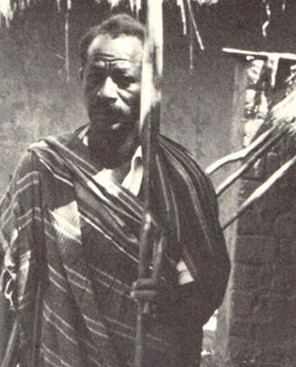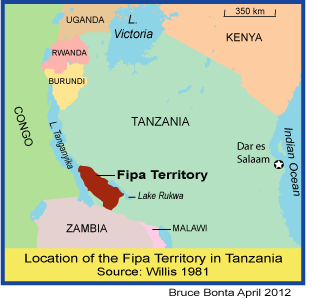Location. A society of over 100,000 people living between Lake Rukwa and Lake Tanganyika, in southwestern Tanzania, East Africa.

Economy. The primary crop among the Fipa is finger millet, though they also raise livestock, hunt, trap, and fish. Their settled farming, when anthropologist Roy Willis studied the society from 1962 to 1966, was based on a sophisticated, efficient composting system that allowed them to live in sedentary, stable villages rather than having to practice slash and burn, shifting agriculture as some other nearby peoples do. Their stability may have helped encourage their intensely sociable culture. However, Prof. Willis indicates (personal communication) that their economy and society has changed over the intervening decades. A news story in 2011 provided updated information about the Fipa agricultural economy plus their social and cultural practices.
Beliefs that Foster Peacefulness. The Fipa worldview is based on beliefs in contrasting, polar opposites—settlers and strangers, villagers and the bush, or the opposite natures of male and female. Their cosmology apparently formed in the mid-nineteenth century, at the same time as their society was radically changing. Not too long before the first European contact, the Fipa completely abandoned their previous warfare, destruction and conflict, and formed states based on peacefulness, prosperity and order. It appears as if their belief systems helped foster governments in the pre-colonial Fipa states that were run, on the one hand, by hierarchies of men, and on the other by magistracies in the villages administered by women. The dualistic governing structures were important components of their peaceful social system.
Avoiding and Resolving Conflict. Traditional integrating devices allowed people who had wronged their neighbors to make public confessions; after confessing, they would toss sand in the air with a winnowing tray to symbolically rid themselves of guilt. Those practices were eliminated by the colonial rulers. More recently, general social tensions (though not specific, interpersonal conflicts) have been released by anti-sorcery movements that periodically sweep through Fipa villages. The anti-sorcerers—lower status people—accuse higher status people of sorcery. They “cleanse” the village of the sorcery, temporarily assume power, reaffirm the traditional harmony and unity of the community, and resolve, at least at the psychic level, the social conflicts. Soon, however, the elders and the prestige class of people in the village resume their normal roles. For more detailed information, see a recent news story about the way Fipa villagers handled a conflict.

Gender Relations. In Fipa society, men and women are socially equal—they eat together, share food and conversation, and play games with each other as equals, customs that are unusual among African peoples. Among the pre-colonial Fipa, women magistrates were normally older people who benefited financially by retaining one-third of the fine money. But the hardest labor in support of the system was done by younger women, who derived little benefit from the dualistic political system. Their resentment at being exploited sometimes erupted when a young woman died in labor or twins were born. Women would go on a rampage through the villages, plundering crops and killing animals. These brief and sporadic attacks on the male economic system were sanctioned by Fipa cosmology, which associated force with sexuality and femaleness.
Social Practices. Social advancement among the Fipa is contingent on peacemaking and social skills, symbolized by the twice-daily meals and frequent beer-drinking sessions which men and women participate in together. During leisurely meals people eat and converse, taking food from the central bowls without intruding on their neighbor’s space and without appearing to be too eager to eat. Drinking rituals differ from eating. People carefully pass the bowls of beer around through the assembled group from one to the next, and the same principle of avoiding any appearance of greed or selfishness applies as during meals. Even when people become quite inebriated during their drinking sessions, everyone maintains the correct forms of courtesy, and people rarely if ever become violent.
Sense of Self. The Fipa do not see themselves as different from others–they have no ‘us’ versus ‘them’ conceptions. The very word ‘Fipa’ is an invention of the Europeans for the people resident on the plateau known as Ufipa. Further, they do not have a concept of the autonomous self as Europeans do. Their views of self and person can be understood best in the complementary terms of their polarized cosmology, in which gender distinctions are merged in the unified concept of human being.
Cooperation and Competition. Despite their peaceful, orderly ways the Fipa are quite energetic and competitive. In fact, there is an undercurrent of competition in the Fipa villages between the major families and their supporters for additional alliances and power. The Fipa leaders are especially competitive for supporters, and there is often an undercurrent of tension during the drinking rituals—the host might try to poison someone. Therefore, the host always takes a sip of beer from a new bowl before passing it along, to show that it is safe to drink. Stresses related to the clandestine reality of tense competition are periodically resolved through the anti-sorcery cults that arise and target the wealthy households.
Social Control. They highly prize pleasing manners, effective social skills, and agreeable speaking. Conversely, they strongly suppress anger, unpleasing emotions, and open expressions of physical violence.
But How Much Violence Do They Really Experience? The Fipa appear to be remarkably non-violent—or at least conflict is well-concealed. When Roy Willis lived for 19 months among them, he did not witness any fighting, even among children. However, our knowledge of the Fipa is based on field research by Prof. Willis more than 40 years ago. To what extent their culture of peacefulness, or the other information presented above, may have changed in the intervening decades cannot be accurately determined at this point.
Many news stories about the Fipa from 2005 on have covered positive trends, such as persistent cultural patterns, interesting religious trends, and agricultural progress, but other reports have described repelling witchcraft practices.
Scholarly Resources in this Website:
- “The Peace Puzzle in Ufipa” (Willis, 1989)
More Resources in this Website:
- In the Ufipa region of Tanzania, the Catholic Church gets involved in local politics.
- The traditional practice of healing continues to be an important aspect of the peaceful Fipa culture.
- Gender equality is an important tradition in Fipa society.
- The Fipa cherish babies so much, they have big parties for them when they are born.
- Witchcraft killings of elderly women are becoming increasingly common among the Fipa, but a program called the Tanzania Men as Equal Partners is training men to be more respectful and helpful for their wives.
Sources in Print: Smythe 2006, Willis 1968, 1980, 1981, 1985, 1989a, 1989b, 1995
Updates—News and Reviews:
Selected Recent Stories
September 25, 2014. Deaths of Pregnant Fipa Women
June 19, 2014. Homeless Fipa Children
November 22, 2012. Agitation Continues Against Lodge in Tanzania
August 2, 2012. More Agitation at Lake Tanganyika Resorts
All Stories
All stories in this website about the Fipa are listed in the News and Reviews Subject Listing

